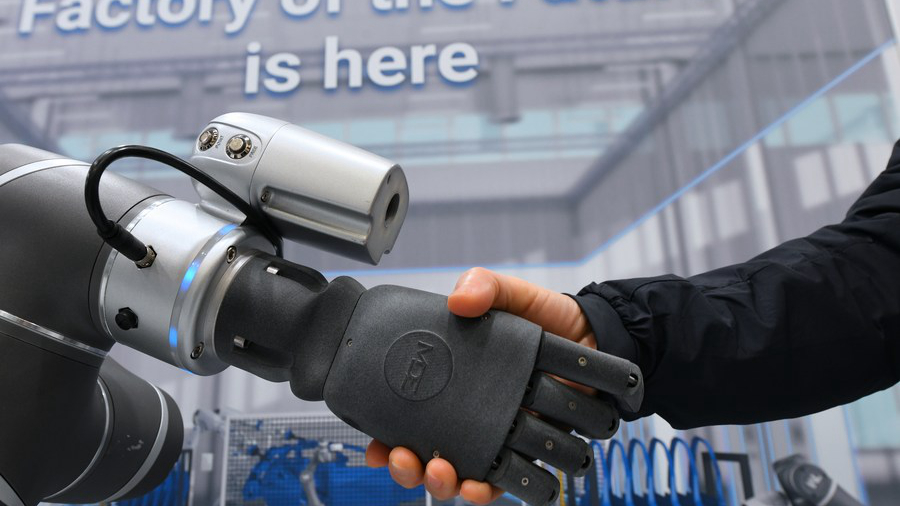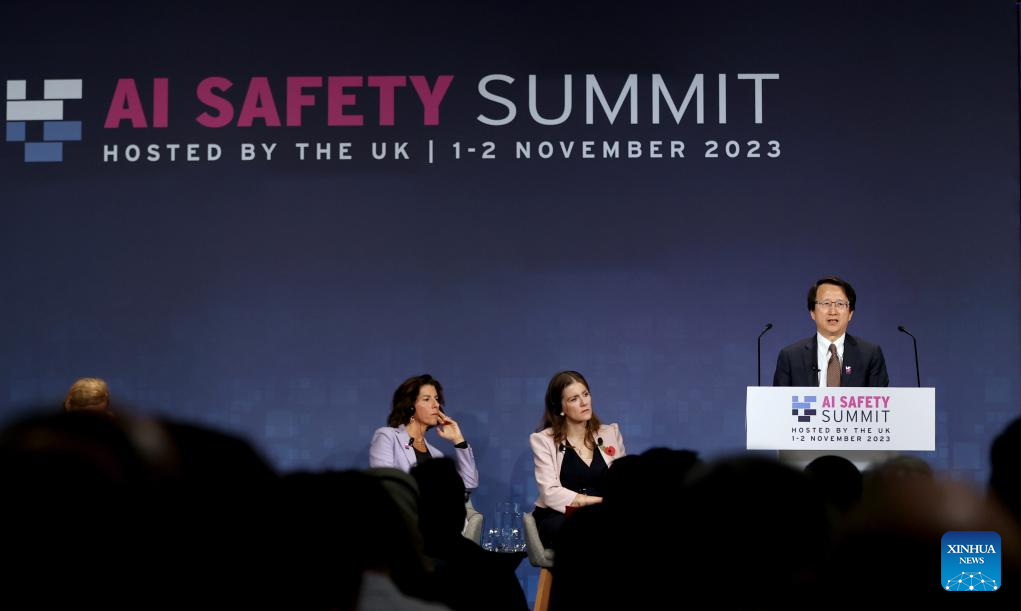
A visitor shakes hands with an intelligent robot at Hannover Messe 2023 in Hannover, Germany, April 19, 2023. /Xinhua
A visitor shakes hands with an intelligent robot at Hannover Messe 2023 in Hannover, Germany, April 19, 2023. /Xinhua
Editor's note: Klaus Schwab, Founder and Executive Chairman of the World Economic Forum, is co-author of The Great Narrative: For a Better Future (Forum Publishing, 2022). Cathy Li is Head of AI, Data and Metaverse and a member of the Executive Committee at the World Economic Forum. The article reflects the authors' opinions and not necessarily the views of CGTN.
The development of artificial intelligence has accelerated considerably, with generative AI systems such as ChatGPT and Midjourney rapidly transforming a wide range of professional activities and creative processes. The window of opportunity for guiding the development of this powerful technology in ways that minimize the risks and maximize the benefits is closing fast.
AI-based capabilities exist along a continuum, with generative AI systems such as GPT-4 falling within the most advanced category. Given that such systems hold the greatest promise and can lead to the most treacherous pitfalls, they merit particularly close scrutiny by public and private stakeholders.
Virtually all technological advances have had both positive and negative effects on society. On one hand, they have bolstered economic productivity and income growth, expanded access to information and communication technologies, extended human lifespans, and improved overall well-being. On the other hand, they have led to worker displacement, wage stagnation, greater inequality, and increasing concentration of resources among individuals and corporations.
AI is no different. Generative AI systems open up abundant opportunities in areas such as product design, content creation, drug discovery and health care, personalized education, and energy optimization. At the same time, they may prove highly disruptive, and even harmful, to our economies and societies.
The risks already posed by advanced AI, and those that are reasonably foreseeable, are considerable. Beyond widespread reorientation of labor markets, large-language-model systems can increase the spread of disinformation and perpetuate harmful biases. Generative AI also threatens to exacerbate economic inequality. Such systems may even pose existential risks to humankind.
For some, this is a reason to tap the brakes on AI research. This March, more than 1,000 AI technologists, from Elon Musk to Steve Wozniak, signed an open letter recommending that AI labs "immediately pause" the training of systems more powerful than GPT-4 for at least six months. During this pause, they argue, a set of shared safety protocols – "rigorously audited and overseen by independent outside experts" – should be devised and implemented.

Wu Zhaohui (R), China's vice minister of science and technology, addresses AI Safety Summit in Bletchley Park, Britain, November 1, 2023. /Xinhua
Wu Zhaohui (R), China's vice minister of science and technology, addresses AI Safety Summit in Bletchley Park, Britain, November 1, 2023. /Xinhua
The open letter, and the heated debate it has triggered, underscores the urgent need for stakeholders to engage in a wide-ranging good-faith process aimed at aligning on robust shared guidelines for developing and deploying advanced AI. Such an effort must account for issues like automation and job displacement, the digital divide, and the concentration of control over technological assets and resources, such as data and computing power. And a top priority must be to work continuously to eliminate systemic biases in AI training, so that systems like ChatGPT do not end up reproducing or even exacerbating them.
Proposals for AI and digital-services governance are already emerging, including in the United States and the European Union. Organizations like the World Economic Forum are also making contributions. In 2021, the Forum launched the Global Coalition for Digital Safety, which aims to unite stakeholders in tackling harmful content online and facilitate the exchange of best practices for regulating online safety. The Forum subsequently created the Digital Trust Initiative, to ensure that advanced technologies like AI are developed with the public's best interests in mind.
Now, the Forum is calling for urgent public-private cooperation to address the challenges that have accompanied the emergence of generative AI and to build consensus on the next steps for developing and deploying the technology.
Generative AI will change the world, whether we like it or not. At this pivotal moment in the technology's development, a cooperative approach is essential to enable us to do everything in our power to ensure that the process is aligned with our shared interests and values.
Copyright: Project Syndicate, 2023.
(If you want to contribute and have specific expertise, please contact us at opinions@cgtn.com. Follow @thouse_opinions on Twitter to discover the latest commentaries in the CGTN Opinion Section.)



